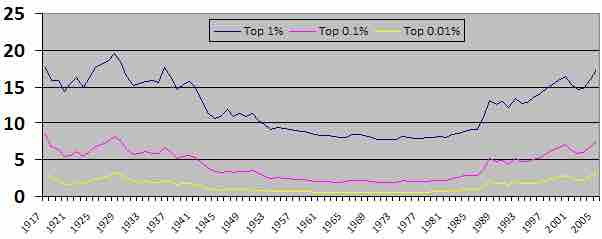Property refers to the sum total of one's possessions, as well as their regular income. It goes beyond income as a measure of social class, as it reflects wealth accumulated (e.g., homes, stocks, bonds, savings) in addition to one's earning potential. Property is a better overall measure of social class than income, as many individuals who are considered wealthy actually have very small income, and those with less property tend to have less power and prestige.

Income
Income is one form of property, and contributes significantly the measures of wealth. In the United States, the top 1% of the population earns a disproportionate amount of national income, coinciding with their position at the top of the social class hierarchy.
Private property is the ownership, control, employment, ability to dispose of, and bequeath land, capital, and other forms of property by persons and privately owned firms. Private property is distinguishable from public property and collective property, which refers to assets owned by a state, community, or government rather than by individuals or a business entity. The concept of property is not equivalent to that of possession. Property and ownership refer to a socially constructed circumstance conferred upon individuals or collective entities by the state, whereas possession is a physical phenomenon.
Economic liberals consider private property to be essential for the construction of a prosperous society. They believe private ownership of land ensures the land will be put to productive use and its value protected by the landowner. If the owners must pay property taxes, this forces the owners to maintain a productive output from the land to keep taxes current.
On the other hand, socialists view private property relations as limiting the potential of productive forces in the economy. They believe private property becomes useless when it concentrates into centralized, socialized institutions based on private appropriation of revenue until the role of the capitalist becomes redundant.
Lastly, libertarians believe that private property rights are a requisite for rational economic calculation, and that without clearly defined property rights, the prices of goods and services cannot be determined in an "efficient" manner, making the most efficient economic calculation impossible.